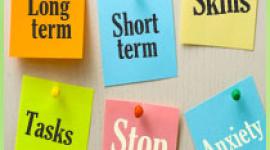Self-Help Stress Management
Stress Management
What is stress?
 All animals, including humans, respond to threat by fighting or fleeing. While deciding what to do, your body gears itself up to respond. Extra stress hormones (adrenaline, noradrenaline, and cortisol) are secreted, your heart pumps faster, blood pressure rises, breathing quickens, perspiration increases, and digestion slows. Taking physical action exhausts the stress hormones. But when stuck behind a desk or in a car, with one tense situation after another, stress chemicals remain in the bloodstream. This causes headaches, creating further anxiety. Eventually your system is so overloaded that a minor incident can prompt a crisis.
All animals, including humans, respond to threat by fighting or fleeing. While deciding what to do, your body gears itself up to respond. Extra stress hormones (adrenaline, noradrenaline, and cortisol) are secreted, your heart pumps faster, blood pressure rises, breathing quickens, perspiration increases, and digestion slows. Taking physical action exhausts the stress hormones. But when stuck behind a desk or in a car, with one tense situation after another, stress chemicals remain in the bloodstream. This causes headaches, creating further anxiety. Eventually your system is so overloaded that a minor incident can prompt a crisis.
What are some of the physical symptoms of stress?
Aches and pains, palpitations and dizziness, loss of appetite or compulsive eating, digestive problems, grinding your teeth, insomnia, breathing difficulties, stammering or speaking too fast, feeling tired, frequent infections, as well as reduced sex drive.
How does stress affect behavior?
It can make you unhappy -- depression, anxiety, panic attacks, feelings of inadequacy, pessimism, and dissatisfaction with life are all part of the picture. It can make you difficult to live with because people under stress are often irritable, irrational, and hostile. It can affect your work performance -- you may be forgetful, lethargic, and unable to concentrate or make decisions.
Can stress make you sick?
Stress may not directly cause illness but it can be a contributing factor, triggering allergies, asthma, migraines, irritable bowel syndrome, eczema, psoriasis, and hives. It's also thought to contribute to high blood pressure and heart disease.
1. Keep a Stress Journal
Describe situations that make you anxious. Ask yourself why you were so distressed. What were your concerns? (I'll never get to the meeting . . . I'll lose my job . . . We'll have to sell the house . . .) How might you think or act differently in the future to help you cope more effectively? List the pros and cons of possible responses to assess your options
2. Learn To Relax
You've read it countless times, but have you practiced it? Relaxing at will lowers blood pressure and slows breathing, metabolic, and heart rates, enabling your body to recover its equilibrium. It takes only 15 minutes. Lie on your back on a firm bed or mat. Let your feet flop outward and your hands rest by your sides. Close your eyes and sigh to release tension. Breathe slowly, pausing after each exhalation. Release tension in your toes, feet, and legs. Then do the same with your fingertips, arms, and neck. Ease tension in your shoulders by lowering them. Mentally smooth the muscles of your face. Be aware of the relaxation in your muscles. When you're ready, slowly open your eyes and stretch. Bend your knees and roll on your side before slowly getting up.
3. Breathing Effectively
Slow breathing from the diaphragm is one of the most effective ways of managing stress. Quick-fix breathing can release tension in a difficult situation. Calm and control your breathing by taking several deep, slow breaths. Return to normal breathing, then repeat. If the tense situation can't be changed, give a mental shrug, sigh, drop your shoulders, and ask yourself, "Who cares?"
4. Coping Techniques
* Meditation induces deep physical relaxation and mental awareness. Sitting comfortably upright, close your eyes and relax. Focus your mind on an object -- breathing out and in to the count of four, or look at an image such as a candle flame or flower, or repeating a word such as "peace" or "one" for 15 to 20 minutes.
* Visualization. Imagine a calm, beautiful scene in detail, smell the scents, hear the sounds. Repeat affirmative phrases such as "I feel peaceful." Before any high-pressure event, picture the scene. Then review what will happen in your mind, watching yourself deal confidently with the situation.
* Mindfulness or active meditation. Give all your attention to whatever you're doing, whether it's putting out the trash or eating dinner. Observe shapes, colors, textures, the movement of your body. Focus on the moment you're experiencing without worrying about the past or the future.
* Yoga. This combines stretching exercises for fitness with controlled breathing, relaxation, and meditation.
5. Exercise
Exercise helps dispel stress hormones from the bloodstream and stimulates the release of endorphins, opiate hormones that give a feeling of well-being. Aim for 30 minutes of moderate activity most days, 15 to 60 minutes of aerobic activity three to five times a week
6. Avoid Stimulants
Say no to excessive caffeine. Sip herbal teas. And drink water -- at least eight glasses a day
7. Try Aromatherapy Oils
Choose from basil, bergamot, cedarwood, geranium, juniper, lavender, rose, sage, sandalwood, and ylang-ylang. Use them alone or combine two or three
next: My Personal Story: Living with Anxiety
~ all articles on patti's panic place
~ anxiety-panic library articles
~ all anxiety disorders articles
APA Reference
Staff, H.
(2008, October 18). Self-Help Stress Management, HealthyPlace. Retrieved
on 2026, January 1 from https://www.healthyplace.com/anxiety-panic/articles/self-help-stress-management



